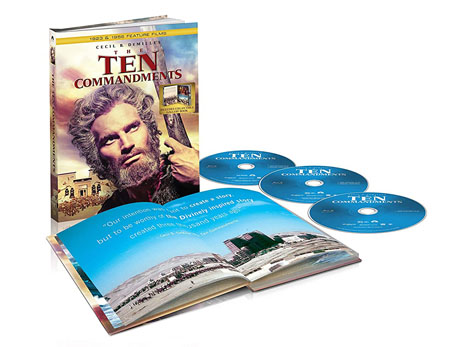
Paramount Home Video has released a new Blu-ray special
edition of Cecil B. DeMille’s epic “The Ten Commandmentsâ€. The set includes
both the director’s original silent film version as well as his 1956
blockbuster remake starring Charlton Heston as Moses. To commemorate the
release of the video, Cinema Retro Editor-in-Chief Lee Pfeiffer caught up with filmmaker Fraser C. Heston to
discuss the impact of the movie on his father’s career. (An interesting
footnote: Fraser Heston is seen in the film as baby Moses, thus, both father
and son played the same character.)
Cinema
Retro: Your
father first worked for Cecil B. DeMille on The
Greatest Show on Earth. Would you say he is the singular most important
person responsible for your father’s rise to fame?
Fraser C.
Heston: Absolutely. My
father was on the Paramount lot and he waved at Mr. DeMille. He had been on the
lot for some other audition and he saw Mr. DeMille by the gate and said,
“Hello, Mr. DeMille†before driving off the lot. Mr. DeMille asked his secretary, “Who was that guy?†She said, “Oh, that’s Charlton Heston. I
think you met him before and you didn’t think much of him.†But DeMille said,
“Well, I think he’s an interesting guy. Why don’t you have him over and I’ll
meet with him?†He ends up offering him the part of the circus manager in The Greatest Show on Earth and it ends
up winning the Academy Award for Best Picture. Then he tells him to come back
for another meeting- he doesn’t even tell him what the part is- and says, “I’m
going to make The Ten Commandments.â€
He shows him models and paintings all afternoon and gets him all excited but he
doesn’t offer him a part. He just says, “I’ll bring you back in a week or two.â€
He ended up asking him, “How would you like to play Moses?†The rest is history, as they say.
CR: Was
your father intimidated by playing such an historic character?
FH: No,
I think he embraced the challenge. He obviously didn’t have to play him from a
baby, as that was my job! But he did have to play him as a young man right up
through when he had that white beard at the end of the movie, however old Moses
was at that point. He also had the
challenge of going from an Egyptian prince to a slave to the leader of his
people- and to do it in a way that perhaps wasn’t as stylized as some of the
DeMille epics. That film, I think, stands the test of time. The reason for
that, I think, is the fantastic cast. Look at Yul Brynner’s performance, for
example. I can’t imagine anyone else playing Ramses.
CR: I’m
trying to remember if your father and Brynner ever worked together again…
FH: They
did on The Buccaneer, which was
produced by DeMille and directed by his son-in-law, Anthony Quinn. Not as good
a film, obviously, but still a classic. Some interesting trivia- if I live long
enough, since I was the youngest actor on the set of The Ten Commandments, I will be the last actor in Hollywood who
worked with Cecil B. DeMille.
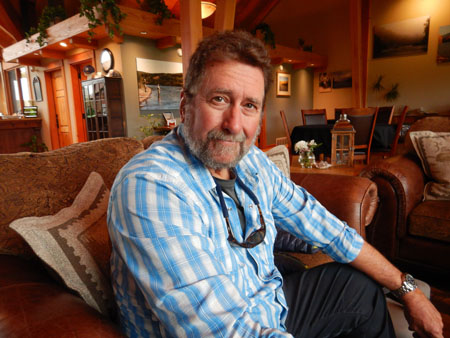
(Photo copyright Fraser C. Heston, 2019.)
CR: I
was recently revisiting your father’s wonderful book “The Actor’s Lifeâ€, which
consists of the daily diary entries he kept when shooting films and discovered
that, unfortunately, he began this habit only after The Ten Commandments has wrapped, though he does discuss
post-production work on the movie. But he does write, “If you can’t make a
career out of two DeMille pictures, you’d better turn in your suit.†He also
writes, “Our son Fraser was born while we were shooting The Ten Commandments. He played the infant Moses at the age of
three months and immediately retired, displaying an acute judgment of the
acting profession.â€
FH: (Laughing) Well, I think I felt a little
pressure from my dad not to follow in his footsteps.
CR: Well,
many offspring of iconic actors have followed in their footsteps with varying
degrees of success. Were you ever tempted to do so?
FH: I
think I was but I was discouraged by my mom and dad. I mean Michael Douglas
pulled it off and a couple of other father-and-son acting teams pulled it off
but I think my parents knew how tough it would be to follow in my dad’s
footsteps. I started out in a different aspects of films. I started out as a
writer and discovered I liked writing screenplays. I got a couple of things
made and from there I started producing and then directing. So I came at filmmaking
more from the storyteller’s point-of-view. I consider myself, even if I’m
directing, to be a storyteller. That’s a director’s job.
CR: When
was the first time you remember seeing The
Ten Commandments?
FH: I
was probably about five and it was pretty terrifying, you know between the
Burning Bush and the destruction of Pharaoh’s army when the Red Sea
collapses…and oh, my God…
CR: …and
let’s not forget the presence of the great Vincent Price…
FH: Yes,
the evil Vincent Price and Yvonne De Carlo and Yul Brynner and everybody. It
was just fantastic. How could you have
seen that as a young person and not been blown away by it all and be terribly
impressed? I think everyone had that experience the first time they saw it.
People in our generation were young when it came out and that was their first
experience with an epic film. I think you have to place the film in a larger
pool of epics associated with my father along with Ben-Hur, El Cid and to a certain degree, Planet of the Apes that culminated in films like Gladiator. You can even go so far as The Avengers series, which are giant
modern epics. I think DeMille started it all. When you think of spectacle, you
think of C.B. DeMille. When you think of C.B. DeMille, you think of The Ten Commandments, right?
CR: I’ve
always said that if you didn’t like the way he directed actors, you had to
admire the way he directed traffic in films that large…
FH: (Laughs) So true!
CR: I
recall you once telling me that in the Heston household, DeMille was a revered
name.
FH: He
was. My dad always called him Mr. DeMille, never C.B. We still have the
telegram he sent my mom and when I was born saying, “Congratulations, he’s got
the part.†I’m looking at a picture on my wall right now. It’s a photo of me at
age four or five being held in my dad’s arms and reaching out and tweaking Mr.
DeMille’s nose.
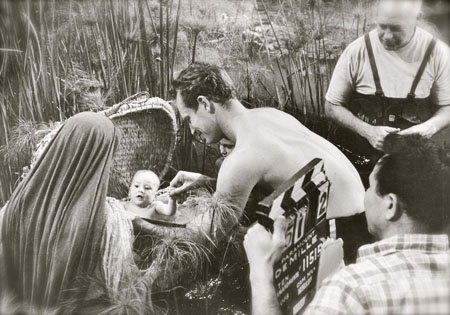
(Fraser as Baby Moses. Photo copyright Paramount Pictures.)
CR: Your father was usually cast as
larger-than-life characters but he gave some of his finest performances on rare
occasions when he got to play ordinary men in films such as Number One and Will Penny. Did he enjoy those opportunities?
FH: Yes,
Will Penny is a good example of that.
He loved that. Even in Planet of the Apes
he played this astronaut who was a bit of a bastard. He’s not a nice guy,
Taylor. He loved playing different kinds of people. He didn’t want to get stuck
playing epic characters like El Cid or Ben-Hur. If you knew him, he was not an
Old Testament character. He was not a stern taskmaster. He was a loving,
artistic, interesting, tolerant individual. He was a good friend. He was a
lover of sports and tennis. He as a great father and a good husband. I don’t
think he felt he was constrained by any of the roles he did. He even played a
Nazi at the end of his career, for God’s sake.
CR: He
rarely played a bad guy. One occasion was when you directed him in Mother Lode.
FH: Yes,
in Mother Lode and in Treasure Island, though you can’t really
count that as a bad guy role. Long John Silver is such a delicious character.
CR: It
must have felt a bit awkward at first as a new director working with your
father, an icon of cinema.
FH: You
know, it’s funny. I was so busy, I never thought about that. I was so concerned
with getting the day’s work and the creative side of it done. Frankly, I had a
great cast. I had my dad, I had young Christian Bale at the age of sixteen, his second film, I believe. I got him right
after Spielberg (Empire of the Sun-Ed.),
I believe. He turned out to be a wonderful guy to work with, even as a young
man. We had Christopher Lee and Oliver Reed and a wonderful, wonderful cast.
That film kind of directed itself. All I did was show up. It’s really my
favorite film that I made with my father.
CR: It
was well-received. Although it was made for American television, it was
released theatrically internationally.
FH: It
was. I went over very well. I still get checks from it!
CR: What
is your favorite Charlton Heston performance on film and what is your favorite
Charlton Heston movie?
FH: Performance-wise,
I’m biased because I made a couple of pictures with him. So I’d have to say
Long John silver in Treasure Island. In
terms of his epic persona, I think you have to give him either The Ten Commandments or Ben-Hur. I think in terms of a little-known
film, you have to give him Will Penny. That’s
his personal favorite. What I loved about dad is that about every eight or ten
years, he would do something completely different and reinvent himself as an
actor and make a success out of it. You know, he started out in the epics and
then he would do something like Touch of
Evil with Orson Welles. He could jump from genre to genre, which a lot of
actors couldn’t do. You know, you never
saw Cary Grant do an epic.
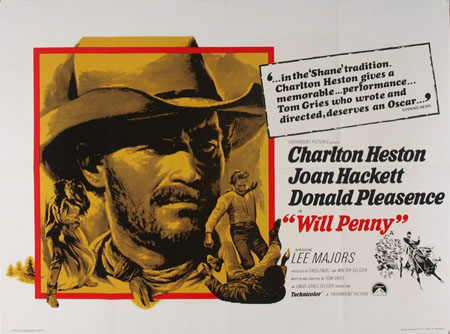
(Heston in the acclaimed 1968 Western "Will Penny". Photo copyright Paramount Pictures.)
CR: He
also dabbled in directing…
FH: He
did. He directed Antony and Cleopatra,
the Shakespearean version which is a pretty amazing film considering it was
made for about three million bucks.
CR: Your
father certainly had his controversies in real life. How would you describe his
legacy?
FH: Look at the two goalposts that he’s known for:
holding up the staff in “The Ten Commandments†and saying “Behold His mighty
hand!†and he’s known for holding up the musket in front of the NRA and saying,
“From my cold, dead hands!â€. It’s the
same line, isn’t it? And he’s kind of playing the same part. He became more
political in the latter part of his life but it was after an entire career of
public service, including things he wasn’t really known for like marching to
the steps of the Washington Memorial with Martin Luther King and serving as a
labor leader when he was head of his union for almost twenty-five years. He was
partly responsible, along with his pal Ronald Reagan, for getting actors
residuals that they so need today. His legacy to me is as a versatile actor, a
great husband, a great father, a dedicated patriot and wonderful American
citizen.
(Fraser C. Heston is a director, screenwriter and producer
who collaborated with his father on numerous feature films and television
productions including “The Mountain Menâ€, “Mother Lodeâ€, “A Man for All Seasonsâ€,
“Treasure Islandâ€, “The Crucifer of Blood†and “Charlton Heston Presents the Bibleâ€.
He is also directed and wrote the screenplay for the acclaimed documentary “The
Search for Michael Rockefellerâ€.)
(Thanks to Deborah Annakin Peters for help in arranging
this interview.)
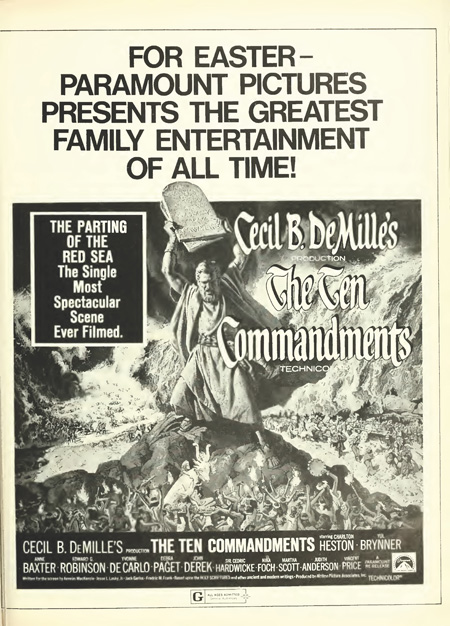
(Trade advertisement for the film's 1972 reissue.)
CLICK HERE TO ORDER "THE TEN COMMANDMENTS" BLU-RAY SPECIAL EDITION FROM AMAZON
